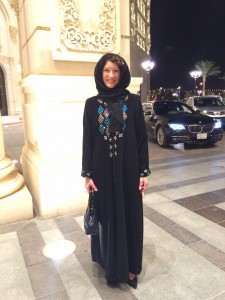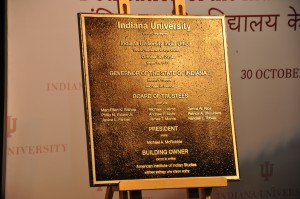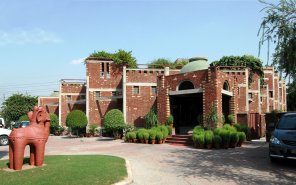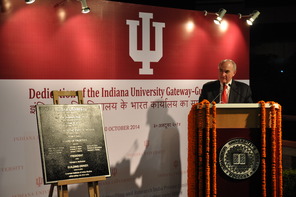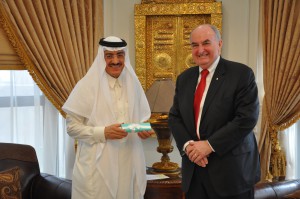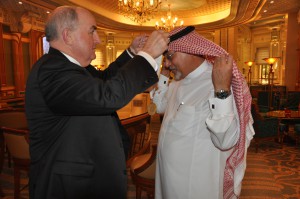Seeing IU’s influence up close in Saudi Arabia
The following guest post was written by Rahaf Safi, who served as IU’s presidential intern in 2013-14 and accompanied IU First Lady Laurie Burns McRobbie during activities in Saudi Arabia. Additional biographical information on Safi is included below.
Like other official IU trips, we started with a briefing on the scheduled events, but this one was a little different. The conversation began with a discussion of the female dress code, because even as non-Saudi women we were required to wear abayas, the traditional garb for women in Saudi Arabia. A separate schedule had been designed for First Lady Laurie Burns McRobbie due to the restrictions on mixed gender gatherings. This was a different experience for both of us, and I had the chance to sit down with her and talk about her impressions of life for women in Saudi Arabia.
We began the trip with a visit to the National Museum. As Mrs. McRobbie noted, it was “women’s day” at the museum and we thought we would be able to remove our abayas. But due to the presence of male security guards and other workers, we had to keep them on throughout the tour. The tour started with the Stone Age gallery and transitioned to the empires and kingdoms that existed up to the pre-Islamic era and during the Islamic period, which then led to the founding of the Kingdom of Saudi Arabia. It was fascinating to see some of the artifacts from the country and to see the emphasis placed on preserving the history of the Arabian Peninsula.
On Monday evening, we attended a dinner given in honor of Mrs. McRobbie by Dr. Maha Alenzy (’04 BS Biology/’06 Language Education), for IU alumnae living in Riyadh. The women who gathered at Dr. Alenzy’s home were both her friends and colleagues as well as graduates of Indiana University. Mrs. McRobbie reflected that once we were inside and could shed our abayas, it felt like any other gathering of alumni, some of whom were meeting for the first time. The women shared the positive experiences they had at IU and the impact their education had on their careers and lives in Riyadh. The IU alumnae experienced a strong sense of community in Bloomington and were happy to have a continued connection when they came back home. As a recent IU alumna, I enjoyed reminiscing about my time at IU with other IU graduates and was happy to hear how far they’ve come along. Many of them are prominent and well-known medical doctors and researchers who are helping to change the image of Saudi women.
One of the guests at Dr. Alenzy’s was Dr. Huda M. Saleh Al-Ameel, rector of Princess Nora Bint Abdul Rahman University (PNU), at a capacity of 60,000 the largest women’s university in the world. Dr. Al-Ameel invited us to visit the university on Tuesday morning. Mrs. McRobbie met with the rector for an hour to exchange information on respective university programs and potential areas of cooperation.
“The rector was very interested in our Arabic language and culture programs, in our new efforts in design, and particularly in our Lilly Family School of Philanthropy. She is actively engaged in building up PNU’s academic quality and its outreach to alumnae,” said Mrs. McRobbie.
After the meeting, we toured the extensive and beautiful PNU campus, which is known for its use of Islamic art. Built in 2011 and covering 8 million square meters, it includes 600 high-tech buildings, dormitories and recreation facilities, a medical school and hospital, housing for faculty and their families, and much more. The campus is designed so that woman can dress comfortably and remove their abayas and hijabs.
On Tuesday afternoon, Mrs. McRobbie met with Lubna Olayan, (’79 MBA, Business), CEO of Olayan Financing Group and on the Forbes list of the 100 most powerful women in the world and second most powerful in the Middle East. Ms. Olayan also directs the Olayan Charitable Trust. Ms. Olayan and Mrs. McRobbie discussed philanthropic traditions in Saudi Arabia as well as Ms. Olayan’s commitment to higher education.
“Her leadership and dedication to giving back to the community are inspiring, and she is in many ways a role model for the future of Saudi business and for Saudi women,” Mrs. McRobbie said.
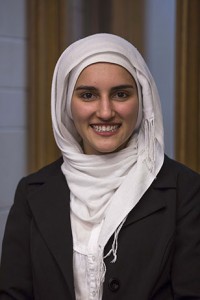
Rahaf Safi accompanied IU First Lady Laurie McRobbie on the first lady’s various meetings in Saudi Arabia.
The last event of our itinerary on Tuesday evening was a dinner hosted by Dr. Nora Aladwani, a faculty member at King Saud University and member of the Shura Council, at her home. Guests included several members of the first group of women to serve on the Shura Council. The council is a legislative body appointed by the king that advises on a range of issues. In 2013, in a historic move, the king decreed that a minimum of 20 percent of the Shura Council members would be women, and it was a great honor to meet some of these pathbreakers. The council members shared that they received a lot of support from their families and male colleagues at the Shura Council, who are also guiding them on the functions of the council. This major reform to the structure of the council has also led to some challenges, but, as Mrs. McRobbie commented, “this first class of female Shura Council members are immensely impressive, intelligent and strong women who are signaling a new path forward for Saudi Arabia.”
While the trip changed many perceptions I had of the Saudi culture, it also reinforced much of the discussion found in the media. The ability of women to drive was inevitably discussed at both dinners, and there was a range of opinion on what the law should be. Mrs. McRobbie summed it up by saying, “What they all agreed on was that it is not the most important issue, but one of many. Their determination to address these issues is inspiring.”
I am proud to be a graduate of a university that values the exchange of ideas and education on an international platform. It was an exciting opportunity to accompany the first lady on her meetings and see IU’s influence across the world.
About Rahaf Safi:
Rahaf Safi graduated from Indiana University in May 2014 with a Bachelor of Arts in political science and philosophy and a certificate from the Political and Civic Engagement program. She served as IU’s presidential intern in 2013-14 with a focus on initiatives related to IU’s international strategic partnerships and the School of Global and International Studies.
In 2014, she was a joint recipient of the Herman B Wells Senior Recognition Award, IU Bloomington’s top academic award for undergraduates. The award is given to an outstanding senior who has excelled academically and has established himself or herself as a leader within the IU community.
In April 2013, she was awarded a prestigious Truman Scholarship, one of only 62 U.S. students to receive an award that recognizes outstanding student leaders who are committed to public service. Deeply involved in civic activities, she founded and served as president of the IU chapter of Oxfam America, an organization dedicated to finding solutions to global hunger, poverty and injustice. She was an intern during the summer of 2013 with the Association of Female Jurists in Dakar, Senegal, and studied at the Université Cheikh Anta Diop in Dakar. She was also an associate justice of the IU Supreme Court and represented the court on the Commission on Multicultural Understanding.
The Wells Senior Recognition Award recognizes excellence in academic achievement and excellence of contribution to the campus community through leadership and participation in campus activities. It is the campus’s top academic award for undergraduates.
Tags: abaya, Huda M. Saleh Al-Ameel, IU Alumni Association, King Saud University, Laurie Burns McRobbie, Lilly Family School of Philanthropy, Lubna Olayan, Maha Alenzy, National Museum, Olayan Financing Group, Princess Nora University, Rahaf Safi, Riyadh, Saudi, Saudi Arabia, Shura Council
IU’s historic day in India
Fans of the popular sport of cricket here in India would call it a “six.”
Hoosiers would call it a “homerun.”
To anyone keeping score — including those here in Delhi, India, and folks back home in Indiana — Indiana University’s dedication Thursday evening of its new IU India Office, the first of the university’s two global gateway facilities (the other is in Beijing), would be deemed a game-changer and an important victory for a university on a continued quest to be one of the nation’s most internationally focused institutions of higher education.
The IU-India connection
While its new India center might’ve been officially introduced Thursday, IU is far from being a rookie player when it comes to India. Its connection with the country, in fact, goes back to the birth of modern India and even before then.
The first Indian student to graduate from IU was Konigapogu Joseph Devadanam, who earned an undergraduate degree in psychology in 1930.
In 1948, IU’s legendary 11th president Herman B Wells joined about 200 people from IU and the surrounding Bloomington community, as well as IU’s Indian students, to celebrate the first year of Indian independence.
Over the next six-plus decades, IU has built a powerhouse program for the study of India, including its history, languages and culture. The Madhusudan and Kiran C. Dhar India Studies Program at IU Bloomington is one of only a handful of such programs in the U.S. Faculty members in the program, located within the School of Global and International Studies, are engaged in research and teaching about India’s history and culture, including contemporary politics, law, literature and business. It is directed by Michael Dodson, who serves as academic director of the new IU India Office.
IU has also formed strong and productive partnerships with several of India’s top universities, including O.P. Jindal Global University, the University of Hyderabad, Symbiosis International University, Indian Institute of Management Lucknow, Indian Institute of Management Shillong, Elite School of Optometry and SHODH: Institute for Research and Development. And the university is continually exploring the possibility of new and meaningful partnerships. IU President Michael A. McRobbie even worked a meeting in around the office dedication at Ambedkar University Delhi. Established in 2007, the fast-developing city-funded university is grounded in the humanities and social sciences and features a strong emphasis on teaching social responsibility.
More than 1,100 Indian students are enrolled at IU campuses across Indiana. This figure represents a nearly 50 percent increase in the number of Indian students enrolled at IU over the past five years.
Additionally, India is a leading destination for IU students pursuing an overseas study opportunity, with more than 100 students currently studying abroad in the country.
Finally, there are about 4,300 IU alumni affiliated with India, who, along with the hundreds of scholars, dignitaries and students who have visited IU campuses, comprise IU’s ever-growing global community.
A new era of collaboration
The formal establishment of the IU India Office on Thursday evening in Gurgaon, a suburb of New Delhi and leading financial and industrial center, ushers in a new era in IU’s longstanding engagement with India. It also signals IU’s desire to work even more closely with leading Indian universities, businesses and other institutions, as well as the country’s social and cultural leaders.
“IU’s presence in India is indicative of our desire to learn about India on its own terms and to begin an exchange that will benefit both India and Indiana and strengthen the connections between India and the United States,” McRobbie said just before officially dedicating the new office, which will serve as a hub for university activities in the country.
Those activities will include scholarly research and teaching, conferences and workshops, study abroad programs, distance learning initiatives, executive and corporate training, alumni events and more. Indeed, many such events have already taken place since the 3,700-square-foot office, within the headquarters of the American Institute of Indian Studies, first opened its doors early last year.
Fittingly, on the morning of its formal dedication, as workers scrambled to put the finishing touches on the evening ceremonial event, the newly refurbished office hosted a workshop on “The Safeguarding of India’s Documentary and Cultural Heritage,” led by IU Bloomington professor of Central Eurasian studies Ron Sela. The workshop, which brought together IU faculty and several acclaimed artists, historians and cultural directors from around India, was a shining example of how the university expects to dramatically enhance its engagement here, for the mutual benefit of its faculty and staff and their Indian colleagues.
Soaring IU spirit
IU spirit was already soaring high as the evening sun set over Gurgaon and office director Michael Dodson welcomed (in English and Hindi) the 70 to 80 guests in attendance to what would be a special ceremony and momentous occasion in IU’s history of internationalism.
Indeed, it was truly a night to remember, as speaker after speaker — including Dodson; IU Vice President for International Affairs David Zaret; Michael Pelletier, deputy chief of mission at the U.S. Embassy in New Delhi; Vice Chancellor of O.P. Jindal Global University Raj Kumar; the Honorable Deepender Hooda, a member of the Lok Sabha, the lower house of India’s parliament, and an alumnus of the IU Kelley School of Business; and, finally, McRobbie — shared his excitement and enthusiasm for the new office and the impact it would have on faculty, students and alumni in Indiana and in India now and in the future.
“Ours is a shrinking world that demands we all work together, which makes me very proud that my university had the vision and took the initiative to launch this important new facility,” Hooda said.
Hoosier pride was palpable as McRobbie unveiled a shiny new plaque commemorating the establishment of the IU India Office and then offered a toast to “the many future pathways of partnership that the IU India Office will help make possible.”
“Dhanyavad and Shukriya,” McRobbie added, sharing a warm Indian “thank you” to all those who helped make the new office possible and those who celebrated in the special occasion.
The president’s words alone would’ve been enough to send everyone home inspired and happy, but, the evening had one more memorable moment in store: a stirring and passionately delivered performance by acclaimed Indian classical musician and sarod virtuoso Ayaan Ali Khan, which put a marvelous coda on a milestone day for IU and its many alumni and friends here in the heart of India.
Tags: Ayaan Ali Khan, Beijing, David Zaret, Deepender Hooda, Delhi, Dhar India Studies Program, global gateway office, Gurgaon, India, IU Alumni Association, IU Global Gateway Network, IU India Office, Konigapogu Joseph Devadanam, Michael A. McRobbie, Michael Dodson, Michael Pelletier, New Delhi, Raj Kumar, Ron Sela, School of Global and International Studies, SGIS
The Hoosier Kingdom
Most people would not likely describe desert-dominated Saudi Arabia as fertile—unless, that is, he or she is a proud Hoosier discussing how the Kingdom is awash in successful and highly driven Indiana University alumni living, working and making major contributions to the growth and development of this dynamic and strategically important country.
A few fast facts:
- There are also more than 600 IU alumni affiliated with Saudi Arabia, and given the growing numbers of Saudi students at IU, the number of alumni will soon increase.
- There are more than 8,500 international students at IU this fall. Nearly 600 of those students are from Saudi Arabia, and the number of Saudi students at IU is growing rapidly. Saudi Arabia has rapidly become one of the leading countries of origin for international students at IU; Saudi students are currently the 4th largest international student body at IU.
Hoosier Nation, Meet the Hoosier Kingdom.
This might be a slight exaggeration, but surprisingly not by much—at least not when you consider just how much IU graduates are impacting many of the leading Saudi businesses, governmental agencies and higher education institutions here in the Kingdom of Saudi Arabia, where, just today, IU signed a new partnership agreement with the premier university in the entire Arab world, King Saud University, and also strengthened ties with a number of its most prominent Middle Eastern alumni at a special gathering in the Saudi capital of Riyadh.
‘The air of the Hoosiers’
IU President Michael A. McRobbie is the first IU president to visit Saudi Arabia in more than 30 years; the last was John Ryan in 1983. In the lead-up to today’s agreement-signing and alumni event, President McRobbie met with a number of graduates whose remarkable successes in their respective areas might only be matched by the enthusiasm they exude as proud members of the Hoosier family.
Many of IU’s Saudi alumni are also supporters of and catalysts for change, and they include a number of female graduates. IU First Lady Laurie Burns McRobbie, who had a separate itinerary from President McRobbie, met with several of those alumnae in Riyadh. They included Lubna Olayan, who received her master’s degree from the IU Kelley School of Business in 1979 and now serves as CEO of the Olayan Financing Group, one of the Middle East’s leading commercial and investment operations. Additionally, the First Lady and former IU presidential intern Rahaf Safi also paid an official visit to Princess Nora University, a public women’s university located in the Saudi capital and the largest university for women in the world. (More about the First Lady’s visit and perspective on Saudi Arabia will be featured in an upcoming blog post.)
Among those with whom President McRobbie met were Bandar Al-Hajjar, the Minister of Hajj, responsible for the provision of facilities for the annual visit of 2.5 million pilgrims to the holy cities of Makkah and Madinah, the largest mass gathering in the world. Al-Hajjar, who earned a master’s degree from IU in economics in 1981, was appointed Minister of Hajj in 2011, becoming the first IU graduate to hold such a high position in the king of Saudi Arabia’s cabinet.
He is currently championing ideas that would better enable Saudi Arabia’s system of higher education to meet the most pressing challenges facing the nation, including, among others, its heavy dependence on oil (nearly 95 percent of the Saudi economy is financed by oil); dearth of renewable energy sources; high unemployment (around 13 percent, with female unemployment hovering around 30 percent); and rapidly growing demand for nurses and quality health care.
McRobbie also met two IU alums, Mohammed H. Alsaigh and Saeed Al Ghilani, who are now consultants for the Saudi Ministry of Higher Education, which oversees the nation’s 28 public universities (a few years ago there were only seven) and dealing with issues of affordability, accessibility and quality concerning the country’s higher education system.
Abdulaziz Aldukheil received both his master’s and doctoral degree in economics from IU Bloomington in 1968 and 1974, respectively. Today, the outspoken alumnus is the head of Aldukheil Financial Group, one of Saudi Arabia’s oldest and most prestigious financial management and consulting firms, which he founded 35 years ago. In his position, Aldukheil offers knowledge, research and advice to numerous ministries and government agencies in the kingdom, and he has also served as a visiting professor at Oxford and Georgetown universities.
“It is my pleasure to have the air of the Hoosiers here,” Aldukheil said, before delivering an impassioned talk about his strong belief in governmental transparency and the need for more highly trained human capital in his country to drive major political, economic and cultural change.
Then there was Sami Baroum, a 1992 Ph.D. graduate of the Kelley School of Business and chairman of the Madinah Institute for Leadership and Entrepreneurship (MILE), a group firmly positioned at the forefront of executive education in the Middle East, North Africa and Asia. Formerly a top executive with the Savola Group, one of the largest business conglomerates in the region with operations in 11 countries, he is considered one of the leading entrepreneurs in the Middle East and a forceful advocate for education, economic development and the establishment of a world-class IT infrastructure.
In Riyadh, Baroum brought his two daughters, one of whom lived in Bloomington and went to elementary school there, to meet President McRobbie, who, in turn, presented the hugely successful, but extremely humble, Hoosier graduate with the Thomas Hart Benton Medallion, given to individuals who have achieved a level of distinction in public office or service and have exemplified the values of IU.
Echoing those values, Baroum said, “My vision for my daughters is how to effect change through education. It was the impetus behind my starting the MILE institute. I have seen how education can shape our lives and help bring about real change.”
IU: Fit for a King
Of course, one has to look no further than King Saud University and, more specifically, its College of Dentistry, to see just how influential IU has been—and continues to be—in supporting the educational foundation in Saudi Arabia.
Today at KSU, several dozen top administrators and faculty welcomed President McRobbie to their campus, about half of whom received some form of educational training at IU. Of the Hoosier alumni contingent at KSU, many are graduates of the IU School of Dentistry, which, over many years, has built an impressive and productive partnership with its KSU counterpart.
Indeed, the IU School of Dentistry boasts a fairly astounding record of success in terms of the number and quality of its Saudi graduates. The school now boasts almost 40 Saudi master’s graduates, and more than half of those graduates come from KSU. Currently, 13 of its 90 master’s track students are from Saudi Arabia and nine are from KSU.

IU President McRobbie and King Saud University President Badran Al Omar sign a partnership agreement between their respective universities.
Just over a year ago, IU Vice President for International Affairs David Zaret signed a formalized agreement between the dental schools that called for building upon the two schools’ longstanding collaboration in producing Saudi master’s and Ph.D. students toward opening IU’s doors to additional students attending programs and visiting scholars.
The partnership in dentistry between IU and KSU has also paved the way for an even deeper relationship between the two institutions, a goal reflected in the university-wide partnership agreement signed today by President McRobbie and KSU President Badran Al Omar. More specifically, the agreement signaled a sizeable first step toward new joint activities in areas in which the two schools have major common strengths, such as language instruction and education.
‘The four corners of Bloomington’
About 70 IU alums from KSU and other universities in the region, as well as from business, government and other areas, all came together this evening in downtown Riyadh in an exciting and impressive show of Hoosier pride and support for their alma mater.
Among the attendees at the IU Saudi alumni reception was Ahmad Turkestani, a professor at Imam University in Riyadh and TV personality, who gave an emotional, heartfelt and inspiring speech recounting his time in the 1980s as a student and parent of young children in Bloomington.
As Turkestani fondly reminisced about IU people and places that had captivated him and many of his fellow Saudi alums while they were here as students (Tulip Tree Apartments, Eigenmann Hall, Bob Knight, the Wells Library, Assembly Hall, Fourth Street, College Mall), rattling them off as if he had just graduated last spring, there was simply no denying the deep meaning, power and impact of the IU-Saudi connection.
“Please give my best to the four corners of Bloomington,” Turkestani said, concluding his remarks and offering proof, on a day when there was lots of it, that Hoosier spirit would continue to rule this kingdom in the months and years to come.
Tags: Abdulaziz Aldukheil, Ahmad Turkestani, Bandar Al-Hajjar, David Zaret, IU Alumni Association, IU School of Dentistry, King Saud University, Laurie Burns McRobbie, Lubna Olayan, Michael A. McRobbie, Minister of Hajj, Olayan Financing Group, Rahaf Safi, Riyadh, Sami Baroum, Saudi, Saudi Arabia



